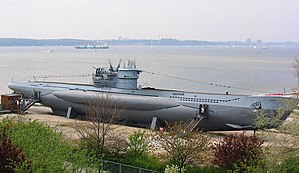German submarine U-1006
 U-995 Type VIIC/41 at the Laboe Naval Memorial. This U-boat is almost identical to U-1006.
| |
| History | |
|---|---|
| Name | U-1006 |
| Ordered | 14 October 1941 |
| Builder | Blohm & Voss, Hamburg |
| Yard number | 206 |
| Laid down | 30 January 1943 |
| Launched | 17 November 1943 |
| Commissioned | 11 January 1944 |
| Fate | Sunk on 16 October 1944 |
| General characteristics | |
| Type | Type VIIC/41 submarine |
| Displacement | |
| Length |
|
| Beam |
|
| Height | 9.60 m (31 ft 6 in) |
| Draught | 4.74 m (15 ft 7 in) |
| Installed power |
|
| Propulsion |
|
| Speed |
|
| Range | |
| Test depth |
|
| Complement | 44-52 officers & ratings |
| Armament |
|
| Service record | |
| Part of: |
|
| Identification codes: | M 54 173 |
| Commanders: | |
| Operations: |
|
| Victories: | None |
German submarine U-1006 was a Type VIIC/41 U-boat of Nazi Germany's Kriegsmarine during World War II.
She was ordered on 14 October 1941, and was laid down on 30 January 1943, at Blohm & Voss, Hamburg, as yard number 206. She was launched on 17 November 1943, and commissioned under the command of Oberleutnant zur See Horst Voigt on 11 January 1944.[2]
Design
[edit]German Type VIIC/41 submarines were preceded by the heavier Type VIIC submarines. U-1006 had a displacement of 769 tonnes (757 long tons) when at the surface and 871 tonnes (857 long tons) while submerged. She had a total length of 67.10 m (220 ft 2 in), a pressure hull length of 50.50 m (165 ft 8 in), an overall beam of 6.20 m (20 ft 4 in), a height of 9.60 m (31 ft 6 in), and a draught of 4.74 m (15 ft 7 in). The submarine was powered by two Germaniawerft F46 four-stroke, six-cylinder supercharged diesel engines producing a total of 2,800 to 3,200 metric horsepower (2,060 to 2,350 kW; 2,760 to 3,160 shp) for use while surfaced, two BBC GG UB 720/8 double-acting electric motors producing a total of 750 metric horsepower (550 kW; 740 shp) for use while submerged. She had two shafts and two 1.23 m (4 ft) propellers. The boat was capable of operating at depths of up to 230 metres (750 ft).[3]
The submarine had a maximum surface speed of 17.7 knots (32.8 km/h; 20.4 mph) and a maximum submerged speed of 7.6 knots (14.1 km/h; 8.7 mph). When submerged, the boat could operate for 80 nautical miles (150 km; 92 mi) at 4 knots (7.4 km/h; 4.6 mph); when surfaced, she could travel 8,500 nautical miles (15,700 km; 9,800 mi) at 10 knots (19 km/h; 12 mph). U-1006 was fitted with five 53.3 cm (21 in) torpedo tubes (four fitted at the bow and one at the stern), fourteen torpedoes or 26 TMA or TMB Naval mines, one 8.8 cm (3.46 in) SK C/35 naval gun, (220 rounds), one 3.7 cm (1.5 in) Flak M42 and two 2 cm (0.79 in) C/30 anti-aircraft guns. The boat had a complement of between forty-four and fifty-two.[3]
Service history
[edit]U-1006 participated in one war patrol which resulted in no ships damaged or sunk.[2]
U-1006 had Schnorchel underwater-breathing apparatus fitted out sometime before October 1944.[2]
On 9 October 1944, U-1006 left Bergen, Norway, for what would be her first, and only, war patrol. Eight days into her patrol, south-east of Faeroe Islands, in the North Atlantic, she was detected by HMCS Annan. Annan proceeded to drop depth charges on U-1006 even though they did not initially believe the contact was a U-boat. Annan then returned to the 6th EG where HMCS Loch Achanalt also made contact with U-1006 and ordered Annan to attack again. The first depth charge attack had badly damaged U-1006 and forced her to surface. U-1006 was able to fire a torpedo at Annan as she approached, but it detonated prematurely causing no damage. After Annan illuminated the area she opened fire on U-1006, which was able to return fire for a short time. U-1006's 44 remaining crewmen abandoned ship and she was sunk by two depth charges, six men had been killed in the attack.[2]
The wreck now lies at 60°59′N 4°49′W / 60.983°N 4.817°W.[2]
See also
[edit]References
[edit]Bibliography
[edit]- Busch, Rainer; Röll, Hans-Joachim (1999). German U-boat commanders of World War II : a biographical dictionary. Translated by Brooks, Geoffrey. London, Annapolis, Md: Greenhill Books, Naval Institute Press. ISBN 1-55750-186-6.
- Busch, Rainer; Röll, Hans-Joachim (1999). Deutsche U-Boot-Verluste von September 1939 bis Mai 1945 [German U-boat losses from September 1939 to May 1945]. Der U-Boot-Krieg (in German). Vol. IV. Hamburg, Berlin, Bonn: Mittler. ISBN 3-8132-0514-2.
- Gröner, Erich; Jung, Dieter; Maass, Martin (1991). German Warships 1815–1945, U-boats and Mine Warfare Vessels. Vol. 2. Translated by Thomas, Keith; Magowan, Rachel. London: Conway Maritime Press. ISBN 0-85177-593-4.
External links
[edit]- Helgason, Guðmundur. "Patrols by U-1006". German U-boats of WWII - uboat.net.
